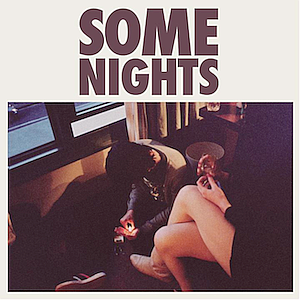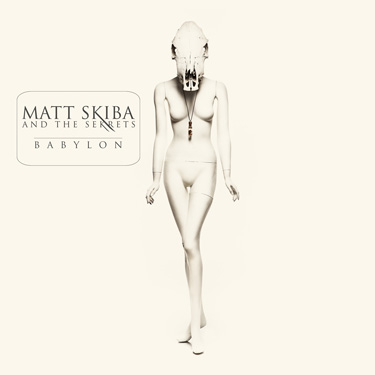Tuesday, April 5, 2011
Heavy Hitters
Posted by
Mike
at
9:28 PM
0
comments
![]()
Labels: Blues, Electronic, Experimental, Fleet Foxes, Folk, Funk, New Albums, Review, Rock, The Kills, TV On The Radio
Saturday, January 22, 2011
Folk The World
Here are two albums, seeped in the folk tradition, that have started 2011 off with a big, giant, musical bang. The Decemberists- The King Is Dead (****½)
The Decemberists- The King Is Dead (****½)
No one would have thought that The Decemberists had it in them to exercise artistic restraint. Their back catalog simply doesn’t set a precedent for it, from the ornate 8 plus minute “The Mariner’s Revenge Song” to 2009’s over-worked/cluttered concept album, The Hazards Of Love. Refreshingly, The King Is Dead strips away the group’s penchant for sonic verbosity and leaves behind warm, rootsy Americana influences in its wake. Gone are the repeated musical motifs and the complicated character studies, replaced with thistle-blown melodies, tumbling bass work, and rich acoustic guitar. Whether it’s the rolling one-two punch of “Don’t Carry It All” or the impending, accordion laced theatrics of “Rox In The Box,” the group’s newfound appreciation for immediacy serves these songs well. Unlike like The Decemberists' pervious effort, The King Is Dead grabs listeners on first spin as opposed operating like a dense, musical puzzle box. This is largely due to Colin Meloy’s richly detailed songwriting, which seems to be concerned with the passage of time. The people that embody his prose fight change (or for change), heartache, and the seasons themselves, belonging to a kind of rustic world that has all but vanished in the advent of modernity. Still, it’s the connections to those feelings and struggles that continue to live on, and Meloy is a master of drawing up the parallels. Whether that’s singing about fading love over the mournful harmonica of “June Hymn,” or his bid for forgiveness on the tenderly strummed closer “Dear Avery,” Meloy is able to wrap his concise parables with a decorative vocabulary and a real sense of humanity. In the end, The King Is Dead succeeds because Meloy decided to craft songs, rather than craft music around ideological abstractions. This results in the album being one of the brightest spots in The Decemberists’ storied discography, one that holds the old and new worlds in balance by keeping lofty ambitions in check.
Key Cuts: Don’t Carry It All, June Hymn, Dear Avery Iron & Wine- Kiss Each Other Clean (****)
Iron & Wine- Kiss Each Other Clean (****)
Guitarist/wordsmith Sam Beam paid his dues by daring to unplug his six string in the 2000s while everyone else around him was busy rediscovering the 80s. As his output has grown, however, Beam’s begun to add to his sound with deeper atmospheres and slicker studio embellishments. In that sense, it’s reasonable to be hesitant, mostly because Kiss Each Other Clean sounds like a sonic train wreck on paper. Combining folk, gospel, and sometimes country sensibilities with spacious, electronic flavored textures seems about as natural as a KISS disco record. Yet Beam pulls it off, mostly because his songs come across as soulful rather than sterile. From the glacial electronics and twinkling keyboards of “Walking Far From Home” to the swirling acid-gaze psychedelics of “Run Rabbit Run,” Kiss Each Other Clean revels in a fascinating sonic tug of war. It’s earthy but pristine, organic yet synthesized. At its heart though, the record is a vehicle for Beam to ponder weighty themes such as salvation, love, spirituality and death. On the bare piano pull of “Godless Brother In Love,” Beam goes so far as to caution his own country with the concerned croon of “She is money and tabs/That broken freedom in/See her big children burning rags/By the riverside…” While Kiss Each Other Clean isn’t short on ambition, its main flaw is it fails to come across as intimately as past Iron & Wine albums have. Beam’s older material hung its frailty and vulnerability on his naked guitar, and it’s difficult to find that same sense of closeness in songs like the 7 minute, sax swathed groove of “Your Fake Name Is Good Enough For Me.” Though the hooks are front and center, and Beam avoids coming across like a robotic pastor, Kiss Each Other Clean is the sound of Iron & Wine attempting to find its footing in a fluid, keyboard-driven twilight. Often stunning, though sometimes clunky, it’s a real treat from one of music’s most brazen songwriters.
Key Cuts: Walking Far From Home, Run Rabbit Run, Godless Brother In Love
Posted by
Mike
at
4:04 PM
3
comments
![]()
Labels: Acoustic, Electronic, Folk, Iron And Wine, New Albums, Review, The Decemberists
Wednesday, December 15, 2010
Honorable Mention: Music In 2010
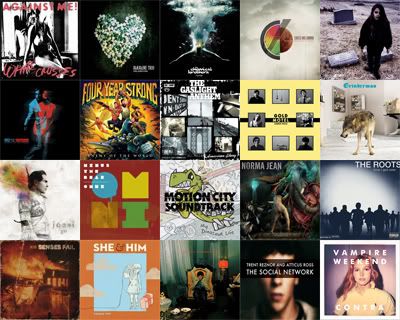 For those that have been following my blog, you know that I make a big deal about my end of the year music list. I think such a summation is the mark of a year well listened, and that's why I always spend a great deal of time on it. Long time readers will notice I've done one every year since starting this blog in 2007, and it seems like it always includes more and more releases as the years go by.
For those that have been following my blog, you know that I make a big deal about my end of the year music list. I think such a summation is the mark of a year well listened, and that's why I always spend a great deal of time on it. Long time readers will notice I've done one every year since starting this blog in 2007, and it seems like it always includes more and more releases as the years go by.
Against Me!- White Crosses (***½): Tom Gabel loves the 80s, anthems, and self-awareness, wrapping it all in the most non-punk package possible.
Alkaline Trio- This Addiction (***½): Chunky hits of graveyard love, but Skiba and Andriano don’t seem as bitter as they used to be.
Atmosphere- To All My Friends, Blood Makes The Blade Holy: The Atmosphere EP's (***): Slug slams his rhymes, Ant blasts his beats, yet peer pressure transforms their typically kinetic hip-hop into something safer.
Avenged Sevenfold- Nightmare (***): The group does their dear and departed drummer proud, scaling back the big rock bravado for leaner thrash.
Beach House- Teen Dream (***½): An airy mixture of dreamy guitars, heavenly vocals, and soft, processed drumming.
Belle & Sebastian- Belle & Sebastian Write About Love (***): Norah Jones stops by to inject some mid-album pep, but it’s the same love struck folk with soft keyboards that the group’s made a living off of since the 90s.
Ben Folds & Nick Hornby- Lonely Island (***): Hornby’s love-lost prose lacks traditionally grabby hooks, but Folds' vanilla extract voice and jumpy piano more than make up for it.
Brandon Flowers- Flamingo (***): Syrupy slide guitar and nocturnal mournfulness keep this from being just another set of Killers songs.
Cee Lo Green- The Lady Killer (***): Cee Lo loves the ladies; he also loves punchy hooks and James Bond soundtracks.
The Chemical Brothers- Further (***½): Stratospheric beats launch this album into calmer space than the group has ever occupied.
Coheed & Cambria- Year Of The Black Rainbow (***½): If you didn’t care about the conclusion of their story you won’t care about the beginning, but at least they’ve added some industrial crunch and metallic flourishes to keep the ride interesting.
Crystal Castles- Crystal Castles (II) (***½): Electro raves in an abandoned church whilst God floods the neighborhood because he’s totally a mean landlord.
Daft Punk- TRON: Legacy OST (***): Decidedly more string heavy than their usual house-inspired sound, but still with enough day glow synthesizers to keep electronic fans satisfied.
Dr. Dog- Shame, Shame (***½): If it is baroque, don’t fix it, especially if your mining Sgt. Pepper’s Era Beatles.
Florence + The Machine- Lungs (***½): Untamed percussion, rich instrumentation, and whirlwind hooks tied together by tempest-like vocals.
Flying Lotus- Cosmogramma (***½): One part Bitches Brew, one part ADD beat-making, all part hipster magnet.
Fitz & The Tantrums- Pickin’ Up The Pieces (***½): Surprising vocal range and brisk drumming propels this vibrant, neo-soul outfit towards relevancy.
Four Year Strong- Enemy Of The World (***½): Ever wonder what it would sound like if Robot Dinosaur Bounty Hunters from Mars decided to play rough, metallic infused pop-punk?
The Gaslight Anthem- American Slang (****): Brain Fallon reminds the iTunes Generation that American romanticism and cinematic images are all just as important as big guitar hooks.
Gold Motel- Summer House (****½): Compared to The Hush Sound, their jangly 60s obsession is a horse of a different color, but Greta and the boys have a knack for making it feel like summer, 24/7.
Grinderman- Grinderman 2 (****): Marrying Stones-y atmospheres with dense psychedelics gave Nick Cave’s fronted garage band their most diverse offering yet.
Hellogoodbye- Would It Kill You? (***): Oodles of horns and acoustic guitar, but scant on spazzy synths and sugary turns of phrase.
Interpol- Interpol (***): A hint of piano, some strings, and a jilted lover around the droning corner, but Interpol excel at simply churning out a different shade of black.
Joanna Newsom- Have One On Me (***): Newsom’s voice flutters around these dense chamber pop arrangements like a canary caught in a music store.
Jenny & Johnny- I’m Having Fun Now (***): Jenny Lewis and Jonathan Rice are in love with the sound of each other’s voices, it’s too bad their collective croon and shimmering folk doesn’t work harder to endear listeners.
Jonsi- Go (***½): Ditching the post-rock drone for dynamic strings and clamoring percussion, Jonsi makes sure we realize he’s Iceland’s most valuable export.
Kele- The Boxer (***): Half messy euro-club dance numbers, half Bloc Party b-sides, and yet somehow Kele still doesn’t make very many enemies.
Ludo- Prepare The Preparations (***): Their frantic energy is more unhinged, the power-pop is poppier, and the songs just as goofy.
Local Natives- Gorilla Manor (***): If Animal Collective had a poppy younger brother yearning for plays on Pandora, and with less Brian Wilson worship…
Maroon 5- Hands All Over (***): Dropping the glitz but keeping the funk, Adam Levine & Co. continue their brand of white boy soul that’s geared towards Top 40.
Matt Skiba- Demos (***): Sketches of unfinished songs, drenched in reverb and built with acoustic guitar.
Max Bemis & The Painful Splits- Max Bemis & The Painful Splits (***): Sketches of unfinished songs, drenched in reverb and built with acoustic guitar.
Minus The Bear- OMNI (***½): Between the Legend Of Zelda synthesizers, the proggy guitar lines, and the sexy beats, you’ll wonder how Mario and Peach got down without this album.
Motion City Soundtrack- My Dinosaur Life (***½): Dry production, enormous power pop choruses, and Justin Pierre’s exuberance make this the group’s leanest offering yet.
Mumford & Sons- Sigh No More (***): Charming, organic, and inoffensive bluegrass, the kind that could crop up in a Michael Cera movie.
Norma Jean- Meridional (***½): Brooding, layered, and operatic post-hardcore that pushes the band’s sound towards nightmarish zeniths.
Ratatat- LP3 (***): Stringent beats mixed with processed guitar; the perfect blend of sounds for Sonic the Hedgehog’s work out mix.
The Roots- How I Got Over (****): Hip-hop elder statesmen craft a message of triumph, hope, and soul searching, set against classic jazz grooves and expressive piano.
Senses Fail- The Fire (***½): Unsatisfied with the reception and execution of their last LP, Senses Fail decides to burn away its memory with grisly vocals, muscular guitar, and frantic breakdowns.
She & Him- Volume Two (****): Zooey Deschanel’s sweet charm and M. Ward’s even sweeter 60s folk treats listeners to the 502nd day of summer.
The Smashing Pumpkins- Teargarden By Kaleidyscope, Vol. I: Songs For A Sailor (***½)/Teargarden By Kaleidyscope, Vol. II: The Solstice Bare (***): In a quest to alienate fans, the Great Pumpkin offers up Volumes 1 & 2 of his tarot card inspired, 44 song psychedelic love child with mixed results.
Spoon- Transference (***½): A combination of warped blues and spacey atmospheres, all wrapped together by Britt Daniel’s sandpaper howl.
Trent Reznor & Atticus Ross- The Social Network OST (***½): Stasis inducing keyboards and dark atmospheres propel this Oscar frontrunner’s soundtrack.
Vampire Weekend- Contra (****): If this slice of suped-up afro-pop doesn’t have you skipping through Urban Outfitters with its twinkling percussion and quirky beats, you’re listening to it wrong.
The Weepies- Be My Thrill (***): Dual vocals help elevate this airy folk, but some more memorable melodies could have gone a long way.
Posted by
Mike
at
11:38 AM
4
comments
![]()
Labels: Electronic, End Of The Year, Experimental, Folk, Hard Rock, Hip-Hop, Pop-Punk, Post-Hardcore, Post-Punk, Power-Pop, Punk, Review, Risky, Rock
Friday, October 29, 2010
Surprise, Surprise!
With my hometown San Francisco Giants in the World Series, it’s only fitting that I begin this entry with a baseball-related lead…
There are times where artists give you big curveballs, the 12-to-6 breaking types to be exact (Sue me, I’m a Barry Zito fan). Here are a few records I didn’t expect to stick with me in the ways they have. Whether it’s a sonic twist, an interesting musical wrinkle, or a question of quality, these are some interesting listens that kept this reviewer on his toes. Bad Books- Bad Books (****)
Bad Books- Bad Books (****)
It’s hard to say what people were expecting when Andy Hull and Kevin Devine revealed they were working on music together. Both men take vastly different approaches to their song craft: Hull gravitates towards a more binge and purge style of emoting, while Devine constructs delicate cathedrals of metaphors from his words. The big question was would they attempt to collaborate, or would it feel like two E.P.s smashed together? In a lot of ways, maybe it was fair to expect songs that sounded like another Manchester Orchestra album, one that merely featured Devine as Hull’s main stay band provided added instrumentation. However, Bad Books’ self-titled record is a fuzzy, folky, and intimate set of songs that feels like its own beast completely. Less the sum of its parts and more the work of a full band, Bad Books breathes with a tender life of its own. Both Hull and Devine create revealing portraits with their words, whether it deals with the life’s bad luck gamblers (“The Easy Mark & The Old Maid”) or the completely clueless (“You Wouldn’t Have To Ask”). Aside from its melodic immediacy, what keeps Bad Books consistent is Hull and Devine’s ability to make listeners empathize with these flawed characters; they feel real, or are at least comparable to people we all know. Sonically, the group wears their love of 90s style rock proudly. The thumping swirl of “Baby Shoes” recalls the quirky jangle of Pavement, while some of the album’s more angular cuts mine Pinkerton era Weezer without feeling derivative. Subtle piano flourishes and full keyboard textures round these songs out nicely, and Bad Books succeeds in creating something no one would have ever expected from Hull or Devine: This year’s sleeper hit.
Key Cuts: The Easy Mark & The Old Maid, Baby Shoes, You Wouldn’t Have To Ask Hellogoodbye- Would It Kill You? (***)
Hellogoodbye- Would It Kill You? (***)
With their new album, Would It Kill You?, Hellogoodbye pose a big question to listeners. The real issue, however, is should they care? At this point, fans will be happy just getting a new album from the Huntington Beach pop outfit. It’s been 4 years since Hellogoodbye dropped their saccharin milkshake of electronic laced power-pop, Zombies! Aliens! Vampires! Robots!, and yet somehow it feels longer. That wait certainly creates lofty expectations for Would It Kill You?; if the band took this long to record an album of pop songs, it really has to be a homerun. And while the album begins with the jumpy rattle and energetic strum of “Finding Something To Do,” Would It Kill You? fails to match up to its predecessor both in songwriting and production. Make no mistake, lead songwriter Forrest Kline can write a chorus as syrupy as Vermont’s finest (“And this thought/Made it clearer/I ought to/Be near her…” he sings on “When We First Met”), but the coy images he conjures somehow lack the charm of the group’s debut. There was a sincerity to his lyrics on Zombies! Aliens! Vampires! Robots!, one that’s lost in Kline’s obsession with Magical Mystery Tour era Beatles song craft. That’s the other really tough sell on Would It Kill You?: The group’s decision to scale back the spazzy keyboards and auto-tune theatrics. Cropping up only in small bursts (The presence of laser beam synthesizers on the horn heavy “Betrayed By Bones” being one of them), Hellogoodbye consciously dial back the slickness in favor of more organic arrangements. There are cleaner guitars (“Something You Misplaced”), more sugary background vocals (“I Never Can Relax”) and a general lack of chaos, which kind of made the group appealing to begin with. It’s an album that’s seeped in sleepy strings, shambling melodies, and delicate percussion. While it sounds nice, it also sounds innocuous. Kline was so focused on making a pristine sounding record that he forgot to really push his arrangements, and that’s big the difference. The old Hellogoodbye would never ask if something would kill you, they’d kill you with kindness.
Key Cuts: Finding Something To Do, Betrayed By Bones, Something You Misplaced
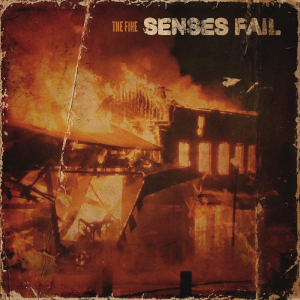 Senses Fail- The Fire (***½)
Senses Fail- The Fire (***½) After their meandering, overproduced third album, Senses Fail had something to prove. Lead singer Buddy Nielsen drove his drinking and his daddy issues into the ground, and the group lost a skilled axe man in Heath Sarceano. Yet, the biggest problem with Life Is Not A Waiting Room was that it stretched their sound to its extremes. The heavier numbers attempted to bludgeon listeners, while the ballads leaned towards melodramatic. This, in turn, made the songwriting feel rigid and stale. The Fire, however, attempts to leave that behind, bringing in truckloads of energy to a band that desperately needed a spark. The album’s title track starts things off with ominous gang vocals, thick muscular breakdowns, and Nielsen’s much improved vocal delivery. While far from an album of hardcore anthems, Senses Fail continue to keep the energy up through The Fire’s 11 blistering tracks, even on the ballads. Both the sharp stomp of “Saint Anthony” and the spidery melodies of “Safe House” remind fans just how addictive the group can be, while the soaring “Landslide” displays the group’s much more vulnerable side. Still, the album’s real strength is its urgency, evident from the furious coarseness of “Coward” or the relentless, crashing riffs on “Lifeboats.” While Brian McTernan provides Senses Fail with his familiar mechanical production tweaks, the songs just come across as more consistent than their last album, even if The Fire’s highs aren’t as memorable. Yet, the album’s brightest spot is its willingness to go out on a limb, to be exposed without relying on clichés. The group seemed a bit lost on Life Is Not A Waiting Room, and while they retreat to some familiar territory here, they should have no problem stepping forward with confidence on their next release.
Key Cuts: Safe House, Coward, Lifeboats
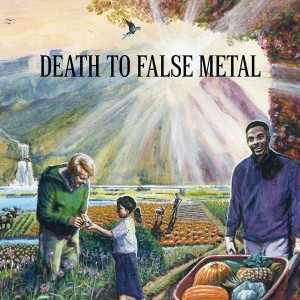 Weezer- Death To False Metal (***)
Weezer- Death To False Metal (***)A strange sense of transparency has permeated throughout all things Weezer in the post-Weezer (The Red Album) era. Fans used to wait 6 years between Weezer albums, under the mindset that Rivers Cuomo was tinkering away like a mad scientist in the studio. While Cuomo has been lauded as having a Fort Knox size collection of demos for potential Weezer songs, Death To False Metal represents a mere ten-track tip of that iceberg. Unfortunately, it’s not a lost album of power-pop gold, and Weezer shows fans that even if you hated Make Believe, they are great editors. The songs that populate Death To False Metal are primarily sketches, and it’s easy to see why Weezer left them off their proper studio albums. The goofy Top Gun style synthesizers of “Auto-Pilot” and the jangly strum of “I’m A Robot,” find the group having fun in the studio, but not really holding anyone’s attention. Still, there are some interesting ideas hidden within Weezer’s familiar chunky fuzz, if not fully formed songs. “Everyone” rumbles with sharp metallic riffing, and “Losing My Mind” expertly displays twinkling melodies against soothing strings. The real highlight, however, is the album closing cover of “Un-Break My Heart,” displaying some desperate sentimentality with mammoth sized bravado. In all, Death To False Metal feels like an inconsistent patchwork quilt of experiments, but grants Weezer’s old and new material some interesting context.
Key Cuts: Losing My Mind, Everyone, Un-Break My Heart (Toni Braxton Cover)
Posted by
Mike
at
3:07 PM
2
comments
![]()
Labels: 90s, Bad Books, Folk, Hellogoodbye, Jangle Pop, Metal, New Albums, Pop, Post-Hardcore, Review, Rock, Senses Fail, Weezer
Sunday, September 19, 2010
...And The Kitchen Sink
It should come as no surprise that my taste is eclectic. Right? Brandon Flowers- Flamingo (***)
Brandon Flowers- Flamingo (***)
If there was any doubt that Brandon Flowers is the primary creative force behind The Killers, look no further than Flamingo. The ten-track puesdo-concept album about Las Vegas (or being lonely in Las Vegas) finds Flowers cherry picking from The Killers' Bowie meets Springsteen worship, with gentler and often successful results. “Only The Young” finds guitars chiming and crying over spacious keyboards while the stutter-stop twinkle of “Hard Enough” features tender guest vocals from Rilo Kiley’s Jenny Lewis. In true Vegas fashion, Flowers’ hammy and overwrought voice makes some of the songs overstay their welcome but that’s part of Flamingo’s charm. Flowers stayed away from making a serious record, as he often attempts to with The Killers, and he made an honest record for himself, rather than his band or his label. The results seem perfect for any night drive with miles of desert ahead.
Key Cuts: Only The Young, Hard Enough, Playing With Fire Grinderman- Grinderman 2 (****)
Grinderman- Grinderman 2 (****)
It’s difficult to make dangerous rock n’ roll theses days. There’s no market for it; everyone wants something slick, auto-tuned, and compressed, something that’s heavy on beats but light on grooves. So when a dirty, sleazy, and downright evil sounding record like Grinderman 2 comes along, you know there’s some guts behind that decision. Nick Cave’s savage blues project has emerged from their bourbon soaked cocoon, producing an immense record with no apologies. While the content matter is familiar Cave fair of murder, obsession, and rough sex, he finds some interesting ways to inject humor into an otherwise demonic album (“I stick my fingers in your biscuit jar…”). Yet what really stands out on Grinderman 2 is the strides Cave has taken in expanding the group’s sound. Grinderman’s first album was loud and raw, but not much else. Grinderman 2 is decidedly larger in scope, reveling in longer songs that feature clamorous waves of wailing wah and dusty drums. “Kitchenette” is a loopy, low-end boogie while “When My Baby Comes” is swathed in eerie strings before erupting in phantasmal distortion. The excess works, and Cave manages to find a way of pushing the production without stripping the songs of their grit. With Grinderman 2, Cave created an album that rivals even his darkest material with the Bad Seeds by sticking to his guns and warped fantasies.
Key Cuts: Mickey Mouse & The Goodbye Man, When My Baby Comes, Kitchenette
 Linkin Park- A Thousand Suns (*½)
Linkin Park- A Thousand Suns (*½) Rap-rock was never highbrow art, but it’s hard to dispute Linkin Park’s mastery of it. It’s the reason fans were upset when Minutes To Minute turned into Linkin Park’s answer to The Joshua Tree. Those listeners were hoping for more consistency, not experimentation, and it was a shock to the system. In theory, A Thousand Suns should be an easier pill to swallow knowing the band could drop a surprise, except it’s not. While the album covers the similar, soft textured aesthetic of its predecessor, Linkin Park flounders under the weight of the album’s pretension. Half the album is comprised of ambient, glitchy interludes that go nowhere, while its actual songs come across as parodies of Public Enemy fed through Kid A’s iPod. Oh, and then there’s “The Messenger,” the album’s acoustic closer where Chester Bennington decides to scream out of tune for about 3 minutes. While the record sounds pristine thanks to Rick Rubin and Mike Shinoda’s deft production, the band sounds confused, attempting to be vaguely political with a record that lacks urgency. In all, it showcases Linkin Park dealing with ideas and sounds that are over their heads. At least they brought the rap part back, except not really.
Key Cuts: When They Come For Me, Year Zero (Nine Inch Nails)
 Terrible Things- Terrible Things (**½)
Terrible Things- Terrible Things (**½)When it’s all said and done, Terrible Things are a band comprised of scrappy castaways. Vocalist/guitarist Fred Mascherino (ex-Breaking Pangea/Taking Back Sunday), guitarist Andy Jackson (ex-Hot Rod Circuit), and drummer Josh Eppard (ex-Coheed & Cambria) thought they could make better music together than with the bands that shunned them, and the results are mixed. While their self-titled debut is a fun slice of lean power-pop, Jackson and Eppard play backing band to Mascherino the entire time. The disc employs the same crunchy but slick one-two punch of Mascherino’s solo effort, Bend To Break, but with more formulaic accents this time around. Strings come and go on “Been Here Before” while guitars inevitably sparkle before they crash on “Up At Night." Some how it’s not as exciting the second time around. Mascherino’s usual charm is evident behind the microphone but it overshadows Jackson, and the stories they tell fail to leave a mark. It's clear they're desperately upset at someone, or something, but the music isn’t telling the same tale. In the end, Terrible Things is very much Bend To Break: Part Deux, which is a shame considering most of the songwriting is credited to the whole band. The good news is that it sounds rather innocuous, which is perhaps why they were dismissed from their mother bands in the first place.
Key Cuts: Up At Night, Terrible Things, Conspiracy
 The Weepies- Be My Thrill (***)
The Weepies- Be My Thrill (***) Charmingly intimate and instantly accessible, The Weepies never have to push hard to create a beautiful sounding record. Be My Thrill, their fourth LP overall, finds the musical duo of Deb Talan and Steve Tannen churning out soft rock anthems that would feel right at home in a Charlie Brown holiday special. Whether it’s the shuffling hook of “Red Red Rose” or the Elliot Smith-like harmonies on “Hummingbird,” The Weepies craft immediate pop music in refreshing fashion. With subtle embellishments of brushed drums and quaint piano, the record retains a certain level of minimalism without feeling lo-fi. There are some drawbacks though; the album’s tandem vocals sport a clear winner when it comes to charisma (Talan’s meek but silky delivery proves quite the attraction), and the album isn’t as richly layered as 2008’s Hideaway, but Be My Thrill is genuinely entertaining. It’s an album reminding music fans that middle of the road records can house decent songs without being contrived or calculated. Not everything needs to be a grand statement, and it’s refreshing to hear The Weepies embody that.
Key Cuts: Red Red Rose, Add My Effort, Hummingbird
Posted by
Mike
at
9:36 PM
1 comments
![]()
Labels: Acoustic, Blues, Brandon Flowers, Folk, Grinderman, Indie, Linkin Park, New Albums, New Wave, Noise Rock, Pop-Punk, Power-Pop, Review, Shoegaze, Synth Pop, Terrible Things, The Weepies
Friday, September 10, 2010
Middle Of It All
Between Labor Day, birthday stuff, mixes, working, and a whole host of other things, it’s been busy lately. Good thing there’s some music in the middle of it all, even if it’s nothing to break the bank over. Interpol- Interpol (***)
Interpol- Interpol (***)
Interpol’s major label debut, Our Love To Admire, drew an unfair amount of ire from die-hard fans. Despite leaving an indie label, the band was still evolving on their terms. While their work was more polished, and hooks began creeping into their hazy songs, their music remained powerful as they experimented with their slow burning sound. It’s sad, then, to see a group grow so self-conscious about their fans’ backlash, self-conscious to the point where they would stop growing try to appease them. And they do try; Interpol’s self-titled album comes across mechanical and painfully constructed, a regression to consciously placate the old guard rather than risk anymore fans in the gamble of growth. The 10 blackly tinged movements that make up Interpol avoid the same penchant for hooks that its predecessor embraced, while the pain and the torment we’re supposed to experience is drowned in a monotonous fog. While “Success” opens up with Interpol’s familiar chiming guitars and warm bass, the song feels stilted when it should feel expansive. This is symptomatic of most of Interpol, songs with promising beginnings are buried under Xanax flavored riffs and Paul Banks’ increasingly robotic croon. Cuts like the locked in neutral “Lights” and the angular “Barricade” confirm such a diagnosis, both dissolving away into a mid-tempo quagmire. Really, the only time Interpol hits on the atmosphere it aims for is when the band expands their instrumental palette, which isn’t often. The haunting “Always Malaise (The Man I Am)” features funeral style piano and sweeping strings, while the jumpy and dry “Try It On” continues to descend into the bowels of something nightmarish. Unfortunately, moments that contain any real dread on Interpol are few and far between, and the group seems bent on conforming to their morose masquerade just a bit too eagerly, to the point where it’s formulaic. It’s a shame, because some of these tracks could have been real engaging portraits of romantic decay, rather than just another shade of black.
Key Cuts: Success, Always Malaise (The Man I Am), Try It On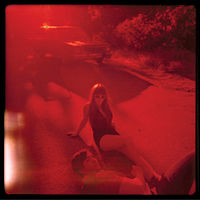 Jenny & Johnny- I’m Having Fun Now (***)
Jenny & Johnny- I’m Having Fun Now (***)
People are obsessed when celebrities get together. It has everything to do with simple math: If “One Person I Admire” hooks up (+) with “A Person Of Equal Or Greater Fame” this becomes (=) “The Internet’s Biggest Obsession Until They Disappoint Us.” Jenny Lewis and Johnathan Rice fall into this equation, sort of. Recording music under the cutesy title of Jenny & Johnny, they created I’m Having Fun Now, a reverb soaked valentine to each other whose narcissism rarely illicits a reaction from people that aren’t Jenny OR Johnny. Now make no mistake, it’s certainly a listenable record; the spacious tremolo and swooning voice of Lewis gives “Big Wave” a breezy and summery feel, but it also earmarks why the record falls short. At Lewis’ best, her sardonic humor and endearing quests for intimacy make her records shine, be it her solo offerings or her work with Rilo Kiley. Rice, on the other hand, straddles a fine line between being a tuneful protégé of Conor Oberst and Tom Petty, stumbling into quirky arrangements with varying consistency. Unfortunately, both these rather charming qualities are absent on I’m Having Fun Now. While the indie power couple works hard to make the record cohesive, their rather one note personalities strip these songs of the ideological tension they so desperately need. The rolling bass of “Slavedriver” backs a loopy take on relationship power struggles rather than an exploration of its dynamics. Elsewhere, the chiming rockabilly of “Just Like Zeus” finds Lewis in pure-male worship mode, which is shocking considering she’s always been such a strong woman. Still, the record is a pleasant listen because some of the disciplined production covers up the ho-hum lyrics. “While Men Are Dreaming” is an airy womb of shimmering keys and harmonic vocals, while “Animal” shambles along with spiky lead work. I’m Having Fun Now isn’t a disaster, but it’s rather bland tone is a bit surprising for a duo of musicians that typically make gripping work. Oh well, such is the case for a couple in love, because when they’re together the relationship takes priority over everything else.
Key Cuts: Big Wave, While Men Are Dreaming, Animal
Posted by
Mike
at
9:34 AM
0
comments
![]()
Labels: Folk, Interpol, Jenny Lewis, Johnathan Rice, New Albums, Post-Punk, Review, Rock
Tuesday, July 27, 2010
Arcade Fire- The Suburbs (***½)
 To their credit, Arcade Fire thinks about every possible angle when it comes to their music. Perhaps other artists do too, but they make that creative anguish invisible to the common listener. Arcade Fire, on the other hand, make it strikingly apparent as they present fully formed works as a testament to their process. And the fans love them for it. Maybe it stems from the way they make 70s style concept albums cool and digestible, or maybe it’s their rag-tag instrumental make up.
To their credit, Arcade Fire thinks about every possible angle when it comes to their music. Perhaps other artists do too, but they make that creative anguish invisible to the common listener. Arcade Fire, on the other hand, make it strikingly apparent as they present fully formed works as a testament to their process. And the fans love them for it. Maybe it stems from the way they make 70s style concept albums cool and digestible, or maybe it’s their rag-tag instrumental make up.
Maybe it says something about their perceived authenticity.
Whatever the reason, you’d be hard-pressed to hear a piece of music from Arcade Fire that wasn’t carefully composed, arranged, and conceptualized.
Their latest album, The Suburbs, is another entry in the line of three heavily throughout lamentations on the battle for the American spirit. With 16 tracks to work with, The Suburbs attempts to display the painful process of watching innocence decay, setting it all to a mix of richly layered soundscapes that try to envelop the listener.
Suffice to say, there are a lot of pieces to The Suburbs, but what’s immediately striking about the overall whole is how subdued the tracks are. There is no epic slash-and-burn or call-to-arms in the vein of Funeral’s “Wake Up” or Neon Bible’s “Intervention.” Instead, the closest The Suburbs comes to that is in the rock n’ roll fuzz and galloping ramble of “Month Of May,” which doesn’t arrive until the album’s latter half.
By and large, The Suburbs is a slow burning record throughout, compartmentalizing its music in a mid-tempo fog.
This doesn’t mean the music is boring; the album’s title track opens things up with a jumpy piano line and shuffling back beat, while the late album cut “Deep Blue” makes careful use of lazy acoustic guitar, stompy distortion, and ghostly backing vocals. However, this is how ALL the arrangements unfold, with very few songs coming across as lean or urgent. Songs tend to run together, especially in the album’s middle, and while each track blooms into the next with calculated precision, the album’s slower moving moods will test even the most observant listener.
While the The Suburbs is built on arrangements that lay layers upon layers of rich instrumentation, there’s not a great deal of separation between these instruments. Instead, the music on The Suburbs seems to be buried in a gauzy miasma, where the individual sounds climb upwards and bleed into each other. While the effect works for the strident strings and twisting theatrics of “Empty Room,” other cuts, like the ascending “City With No Children,” and the meandering “Half Light II (No Celebration)”get lost in the thematic shuffle. Yet ultimately, it’s clear that the hazy cloud wrapping around these melodies is supposed to evoke some sense of a dreamscape where our characters dwell, a symptom of the album’s concept rather than poor production.
Interestingly enough, it’s here that The Suburbs shines brightest, for it’s general concept often comes across as more engaging than the music.
Win Butler aims to tell a story about wide-eyed youths living their lives in the perfection of their dreams. On cuts like “Modern Man,” Butler’s high strung wail laments, “So I wait my turn/I'm a modern man/And the people behind me/They can't understand…” showing us the romance that comes from such a secret and special places. Unfortunately, these dreamers must come back to reality, and it’s the realization that they must eventually become similar to those that structured the world before them that makes The Suburbs such an interesting concept album.
While Butler romanticizes the suburbs as a place these dreamers have created to reject the intolerance and dangers of the world at large, he’s a ruthless author as he displays their maturation as the cause of innocence lost, and the ultimate undoing of their dream world. The realization is a sobering one on “Sprawl (Flatland)” where Butler sings, “Said, well where do you kids live?/Well sire, if you only knew/What that answer’s worth/Been searching every corner/Of the earth…” Coupled with the disc’s transition into a more electronic infused sound as opposed to the first half’s folksier tendencies, and it’s clear that the Arcade Fire’s planning all went into conceptualizing these grand sweeping statements.
Too bad it takes listeners a lifetime to get there.
The main problem with The Suburbs is that it’s overworked. For every solid number like the throbbing synth soaked “Sprawl II (Mountains Beyond Mountains)” there’s equally floundering ones in the repetitive “Rococo.” The group could have easily cut a few songs and kept the strongest melodies, allowing listeners to become invested in The Suburbs much more immediately. As it stands, the group has come up with a bloated record, a batch of songs that never really climaxes, even though there’s plenty going on.
And perhaps that’s the point, for real life never climaxes they way we’d expect it to either. Perhaps, in their infinite wisdom, the Arcade Fire has created the perfect concept album to parallel the shadow of adulthood. Throughout all their existential ennui, maybe they’ve found a way to display the feeling one has when life stops being in front of them, and starts residing behind them.
Maybe on paper, they’ve planned the perfect album, while in reality, they’ve simply recorded a good one.
Key Cuts: The Suburbs, Deep Blue, Sprawl II (Mountains Beyond Mountains)
Sounds Like: Revolver (The Beatles), In The Aeroplane Over The Sea (Neutral Milk Hotel), Rattle & Hum (U2)
Click on the artwork to sample The Suburbs for yourself!
Posted by
Mike
at
8:06 PM
2
comments
![]()
Labels: Arcade Fire, Electronic, Folk, Indie, New Albums, Review, Rock



